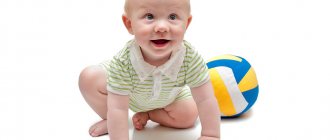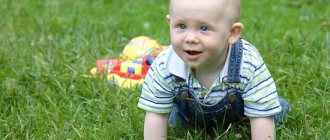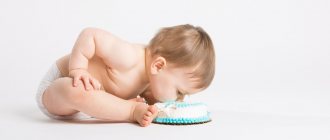Each child born into the world is unique and the pace of development of children may vary. Some babies are just starting to roll over at five months, while others are already managing to stand on their feet for the first time. And yet, there are a number of indicators in the development of children in the first year of life, by which you can understand whether everything is in order with the baby’s health and psycho-emotional development.
If a child cannot do something by a certain age from the so-called control indicators, then there is a reason to consult a pediatrician. In the description of what a child should be able to do by month , this very control indicator is highlighted separately. All other achievements in the baby may appear a little earlier or later - it depends on the individual pace of development of each particular child.
What should a 2 month old baby be able to do?
Next month the child sleeps less - up to 18 hours a day. Strong muscle tone decreases, so it can respond to environmental factors with even greater activity and plasticity.
At 2 months, a child should be able to:
- accurately follow with the eyes the object being moved in front of him;
- meet the gaze and perk up at the one who approaches the crib, and also see him off;
- recognize laughter and smile back;
- turn your head in the direction where the noise is coming from;
- turn your head to the side when lying on your stomach;
- pull your fingers into your mouth and suck;
- coo clearly and make ringing separate sounds.
Speech features
When dad returns home from work, the child is sincerely happy and tries to say the word “dad.” The child makes vowel sounds when looking in the mirror.
The baby understands what his family is saying to him, he easily picks up intonation and facial expressions. In order for your baby to have a large vocabulary, you need to constantly talk to him, but you can’t babysit, you need to communicate as equals. Some children at the age of 1 year can pronounce basic words (mom, dad, give, no, yes, meow, woof, lala, kaka, etc.) . Here's what a 1-year-old child should say:
- Gives answers to basic questions from adults (who is this or what is this?, what is the dog, cat doing?)
- Reacts to his name with sounds or facial expressions.
- Understands the words “no”, “yes”, “possible”.
If the baby is silent and does not say a word by this time, do not immediately panic. If he has no reaction to words at all, then you need to show the baby to a specialist - there may be problems with the hearing organs or psychological disorders. Timely treatment will help get rid of minor abnormalities, so you need to be attentive to your child.
What should a 3 month old baby be able to do?
At 3 months, the baby is significantly different from how it was brought from the hospital. The baby needs the company of his parents more and often asks to be held.
During this period, he expresses his emotions more clearly (what is this?), and coordination of movements improves.
So, at 3 months he should already:
- attract the attention of relatives;
- cry with different intonations to share your “feelings” and laugh loudly;
- turn your head;
- rise on your elbows when lying on your stomach;
- roll over from back to side;
- when picked up, press the legs and arms towards the body;
- hold the toy tightly and pull it into your mouth.
Walking
The baby confidently and without tension stands on his feet and orients himself in space. Children especially enjoy overcoming obstacles: moving at a side step on steps, bending, turning, stepping over obstacles. And what a joy it is to climb into a chair or on a sofa many times in a row and come back down the same number of times!
ATTENTION! At this age, the child is unusually active. He runs from room to room, to the kitchen, interacting with objects. The task of adults at this stage is to ensure the complete safety of the child, remove sharp objects, electrical appliances, matches and anything that could cause harm.
ADVICE FOR PARENTS. It is better to choose shoes with corrugated soles, lightweight, adjustable in fullness. For proper formation of the foot, it is necessary to purchase shoes with a hard heel, made from natural materials. It’s good if the sole is made using modern technologies and can serve as a shock absorber when jumping.
Outdoor games
The most favorite games for kids at this age are ball games. There are a great many of them. “Catch - catch! ", "Where did the ball go", "Throw the ball into the box", "Catch up with the ball", "Collect balls according to the color of the basket", "Jump like a ball" and others. In addition, any obstacles are suitable for developing movements: stairs, planks, uneven surfaces. The game with a sunbeam, “Hide and Seek”, “Sunshine and Rain”, “I’ll Catch Up - I’ll Catch Up” is a lot of fun.
What should a 4 month old baby be able to do?
The first quarter of the year has passed, and the baby has adapted to the environment after being inside the mother for a long time. He not only loves to study his fingers, but can also stare at a passing car through the window.
At 4 months the child begins:
- smile back and coo;
- recognize parents and other people who often approach the baby;
- show interest in all objects around, especially in your reflection in the mirror;
- not only hold the toy tightly in your hand, but also shake it, knock on the table or crib;
- show negative emotions if they give you the wrong item that you like and want;
- lying on your stomach, raise your shoulders along with your head;
- roll over from stomach to back, and vice versa.
Physiological changes
A one-year-old baby becomes three times heavier than he was at birth. The rate of growth and weight gain slows down after the first year of life. In children of this age, flat feet are normal. When he masters walking, this feature will disappear and a curve will appear at the feet. The mother should more often allow the baby to walk barefoot on sand, grass, small pebbles or other uneven surfaces.
The baby should already have several teeth, the average number is 8, but some may have 12. If 2 teeth come out, this is also considered normal. If teeth are completely missing at one year of age, parents should consult a pediatrician.
To check whether a child deviates from the norm in development, you need to conduct a small test :
- Ask for something simple. This way the mother can check whether the baby understands what is being asked of him.
- Say a phrase or ask a question that requires a clear answer. The baby must make at least one gesture (shrug shoulders, wave his hand or shake his head negatively).
- Take his hand and try to take a few steps with him. The baby should confidently walk on his feet with the help of his mother.
If the parent was alarmed by anything during this check, she should tell her pediatrician about her concerns. The specialist will give a detailed answer as to why this is happening and, if necessary, prescribe further examination.
What should a 5 month old baby be able to do?
The period of 5 months is characterized by a slowdown in physical growth, and mental development comes to the fore. The child acquires new skills and improves those he already had.
At 5 months, a child typically:
- walk and babble;
- purposefully throw a toy on the floor if it is no longer interesting;
- distinguish mom and dad from their acquaintances whom you have not seen before, and react to them negatively or warily;
- be able to occupy yourself for a few minutes by playing with some interesting object;
- look at images in books and magazines;
- lying on your stomach, raise your upper body with outstretched arms.
Kids mode
After 12 months, the baby has difficulty falling asleep during the day and may throw tantrums during the daytime. This is due to regime change. The child begins to wake up later and goes to bed later.
The mother needs to change the child's diet. If he sleeps for a long time during the day, feeding him 5-6 times will no longer be possible. Then you need to organize 4 meals a day, for example, at 9.00 - breakfast, at 12.30 - lunch, at 16.30 - afternoon tea and at 20.00 - dinner. If the baby still sleeps several times a day, then the routine may remain the same as before.
A mother should develop her child in every possible way, reading him poems, fairy tales, and singing a lullaby before bed. The brains of children at this age, like a sponge, can absorb a lot of information. It is useful to play story games and show finger theater. To develop fine motor skills, you can offer your baby games with sand, salt dough, plasticine, beans or water.
From the age of one, you can start drawing using finger paints. You can suggest drawing on the asphalt with crayons. The baby will be delighted with the soap bubbles that he will try to burst. Walking in the fresh air and playing in the sandbox have a positive effect on development.
What should a 2 year old child be able to do?
Over the course of a whole year, children actively develop their speech and movement, which parents cannot always keep an eye on.
What should a 2 year old child be able to do:
- run;
- go up and down stairs without assistance;
- step over a hole or puddle;
- try to draw;
- kick the ball;
- be able to eat carefully;
- play with plasticine, cereals;
- name several colors and geometric shapes;
- show how old you are on your fingers;
- go to the potty independently;
- continue the verse that you learned with your parents, if you name the first lines to the rhyme;
- listen to stories that are read to him and remember some parts.
Demonstration of independence
At one year of age, almost all children want to be independent and try to eat while holding a spoon or fork in their hand. The child can take the cup without adult help and drink liquid from it. He enjoys nibbling on carrots, cookies or other solid food.
The baby is trying to put on clothes while getting ready for a walk, and if the mother has time, she needs to let the child finish what she started and under no circumstances rush him. By this age, a child already has certain preferences in clothing, food, and toys.
When washing his hands, a one-year-old baby will want to dry them with a towel himself. At this age, children perceive the potty as just another toy and happily sit on it, but do not yet understand what needs to be done. You can already explain to a small child what it is and why this item is needed, but there is no need to demand from your son or daughter that they relieve themselves there.
Some children make a specific sound while walking small or large, so the mother needs to closely monitor her child and teach him to sit on the potty at the exact moment when he gives a signal, but if the baby actively resists, there is no need to force him.
What should a 3 year old child be able to do?
Another crisis occurs during this period of childhood. Boys and girls clearly understand themselves as separate individuals. Therefore, they often contradict their parents, trying to establish themselves.
What a 3 year old child should be able to do:
- speak in short sentences;
- recite a short poem;
- know your first and last name;
- look for differences between objects;
- draw lines and color;
- quietly stay without your parents for several days;
- eat, dress, brush teeth and wash hands independently;
- play the ball confidently.
How to pass a school interview
Often, during an interview, parents place the main emphasis on education, but an important part is also occupied by psychological preparation, which will relax the child and allow him to show his full level of development.
Tips to help you pass a school interview:
- mandatory presence during testing. If both parents can come, it will be a big plus and support.
Children often try to gain parental approval in the process, so their presence will also provide additional motivation; - do not interfere with the process. Firstly, it distracts and switches the child, and secondly, it gives him a reason to doubt the correctness of his own answers, and he will wait for further clues;
- It is better to organize the test day so that before it you can walk with the child, talk about abstract topics, laugh, and imbue the child with positive emotions. It is better not to go immediately after sleeping or eating, as the child will still be relaxed;
- be sure to tell or play where you are going. Outline in general terms how things will happen, but do not overestimate the importance so as not to scare them;
- Don’t be nervous yourself, as the parents’ anxiety will certainly be passed on to the child.
On a note!
And remember that in any case, the child’s place at school is assigned, and if he has not passed the test at some special school, then there is always the opportunity to improve his knowledge and transfer.











